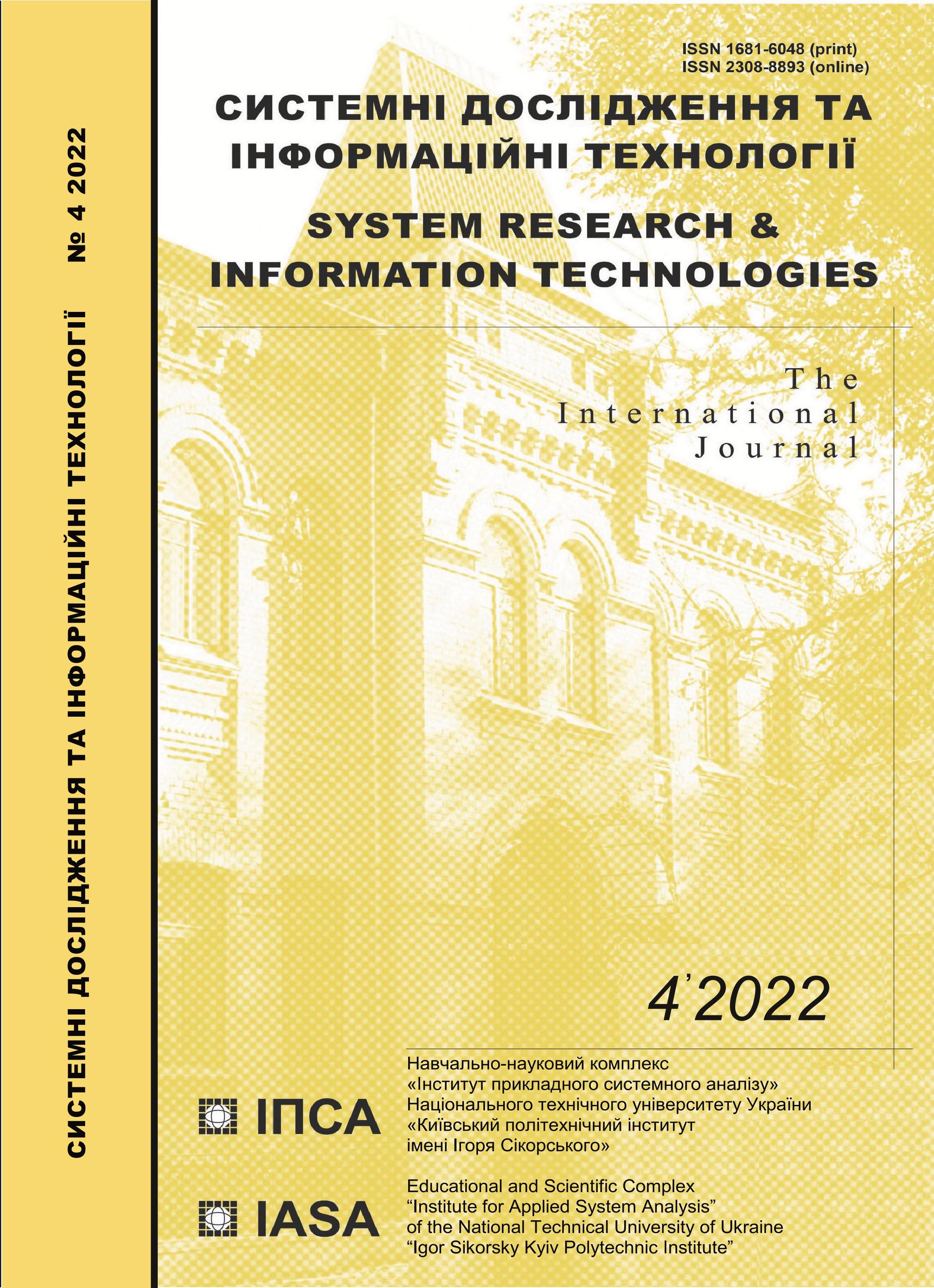Analysis and forecasting the level of the sustainable development in the European context
DOI:
https://doi.org/10.20535/SRIT.2308-8893.2022.4.02Keywords:
sustainable development, European context, approximation model, territorial development indicators, forecastingAbstract
The article highlights the results of the conducted research on forecasting the level of sustainable development in the European context. Based on the analysis of the scientific achievements of domestic and foreign scientists, it was determined that the existing methodologies had several problems associated with using a large number of indicators, which made it impossible to estimate a new object or period quickly. While considering this fact, the research aimed at constructing a model for calculating the level of sustainable development based on a limited set of open data, which would significantly facilitate the process of its assessment and forecasting. The basis of the research is data from the World Data Center for Geoinformatics and Sustainable Development and the “Sustainable development index” project. Modeling and analysis were carried out in MS Excel and RStudio applications. The obtained results demonstrate that it is possible to predict the level of sustainable development based on the approximation model using a limited set of territorial development indicators, which will lead to the loss of a minimal amount of information.
References
O.O. Muzhylko, “The main origins of the idea of sustainable development and the path of Ukraine’s transition to the principles of sustainable development,” (in ukr.), Derzhavne upravlinnya: udoskonalennya ta rozvytok, no. 7, 2011. Available: http://www.dy.nayka.com.ua/?op=1&z=300
Michael Zgurovsky, “Impact of the information society on sustainable development: global and regional aspects,” Data Science Journal, vol. 6, Supplement, pp. 137–145, 11 March 2007. Available: https://www.jstage.jst.go.jp/article/dsj/6/0/6_0_S137/_pdf
V.B. Burkinskij, V.N. Stepanov, and S.K. Harichkov, Economic and environmental bases of regional nature management and development, (in rus.). Odessa : Feniks, 2005, 575 p.
R.M. Nurtdinov and A.R. Nurtdinov, “From the theory of economic growth to the concept of sustainable development: issues of rethinking,” (in rus.), Vestnik Kazanskogo tehnologicheskogo universiteta, 2012. Available: https://cyberleninka.ru/article/n/ot-teorii-ekonomicheskogo-rosta-k-kontseptsii-ustoychivogo-razvitiya-voprosy-pereosmysleniya
L. Scutaru, “Economic Development Versus Sustainable Development,” Ecoforum, vol 2, no. 1, 2013. Available: http://www.ecoforumjournal.ro/index.php/eco/article/view/19
O.V. Khanova and S.O. Skibina, “Sustainable development of the EU countries: evaluation methodology and indicators,” (in ukr.), Problemy ekonomiky, no. 3, pp. 20–32, 2017.
A.V. Tsvikilevich, Improvement of management of municipal education development, (in rus.). M.: Akademija estestvoznanija, 2006, 138 p.
“Sustainable Development Report 2019,” Sustainable Development Report. Available: https://sdgindex.org/reports/sustainable-development-report-2019/
“Sustainable Development Report 2021,” Sustainable Development Report. Available: https://www.sustainabledevelopment.report/reports/europe-sustainable-development-report-2021/
Jason Hickel, “The sustainable development index: Measuring the ecological efficiency of human development in the Anthropocene,” Ecological Economics, vol. 167, 106331, January 2020. Available: https://www.sciencedirect.com/science/article/abs/pii/S0921800919303386
Sustainable Development Analysis: Global and Regional Contexts. Part. 1. Global Analysis of Quality and Security of Life; International Council for Science (ISC) and others; Scientific Supervisor of the Project M. Zgurovsky. K.: Igor Sikorsky KPI, 2019, 328 p. Available: http://wdc.org.ua/sites/default/files/SD2019-P1-FULL-EN.pdf
I.M. Koreneva, “Peculiarities and genesis of the idea of sustainable development as a methodology of modern education,” (in ukr.), Visnyk Cherkaskoho universytetu. Seriya “Pedahohichni nauk”, issue 5, pp. 95–102, 2018. Available: https://ped-ejournal.cdu.edu.ua/article/view/2512/2655
K.Ju. Belousov, “The current stage of the evolution of the sustainable development concept and forming the paradigm of corporate sustainability,” (in rus.), Problemy sovremennoj jekonomiki, 1 (45), 2013. Available: http://www.m-economy.ru/art.php?nArtId=4424
V.Ye. Khaustova and Sh.A. Omarov, “The concept of sustainable development as a paradigm for the development of the society,” (in rus.), Problemi ekonomiki, 1 (35), pp. 265–273, 2018. Available: https://www.problecon.com/export_pdf/problems-of-economy-2018-1_0-pages-265_273.pdf
Puja Mondal, “What is the Importance of Sustainable Development?”, Your article library the next generation library. Available: https://www.yourarticlelibrary.com/environment/what-is-the-importance-of-sustainable-development/9910
The SDGS in action. United nations Development programme. Available: https://www.undp.org/sustainable-development-goals
Sustainable Development index. Available: https://www.sustainabledevelopmentindex.org/
World Economic Situation and Prospects: statistical annex. United Nations New York, 2020. Available: https://drive.google.com/drive/u/0/folders/1GlKLeIOeXaGMxgpLNUd3WO9XcUv-EGsd
World population pyramid from 1950 to 2100. Available: https://www.populationpyramid.net/ru/%D0%BC%D0%B8%D1%80-%D0%B7%D0%B5%D0%BC%D0%BB%D1%8F/2024/
I.O. Pyshnohrayev, I.O. Tkachenko, and S.V. Hapon, “Potential of night-time lights data to critical analysis of countries’ socio-economic indicators,” (in ukr.), Ekonomichnyj visnyk NTUU "KPI", no. 19, pp. 54–62, 2021. Available: https://doi.org/10.20535/2307-5651.19.2021.240492

